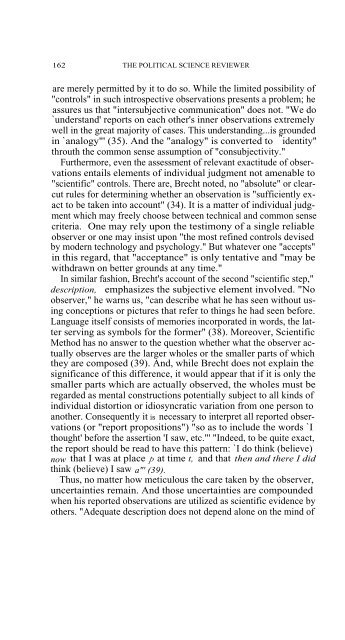ARNOLD BRECHT'S POLITICAL THEORY REVISITED Political ...
ARNOLD BRECHT'S POLITICAL THEORY REVISITED Political ...
ARNOLD BRECHT'S POLITICAL THEORY REVISITED Political ...
Create successful ePaper yourself
Turn your PDF publications into a flip-book with our unique Google optimized e-Paper software.
162 THE <strong>POLITICAL</strong> SCIENCE REVIEWER<br />
are merely permitted by it to do so. While the limited possibility of<br />
"controls" in such introspective observations presents a problem; he<br />
assures us that "intersubjective communication" does not. "We do<br />
`understand' reports on each other's inner observations extremely<br />
well in the great majority of cases. This understanding...is grounded<br />
in `analogy"' (35). And the "analogy" is converted to " identity"<br />
throuth the common sense assumption of "consubjectivity."<br />
Furthermore, even the assessment of relevant exactitude of observations<br />
entails elements of individual judgment not amenable to<br />
"scientific" controls. There are, Brecht noted, no "absolute" or clearcut<br />
rules for determining whether an observation is "sufficiently exact<br />
to be taken into account" (34). It is a matter of individual judgment<br />
which may freely choose between technical and common sense<br />
criteria. One may rely upon the testimony of a single reliable<br />
observer or one may insist upon "the most refined controls devised<br />
by modern technology and psychology." But whatever one "accepts"<br />
in this regard, that "acceptance" is only tentative and "may be<br />
withdrawn on better grounds at any time."<br />
In similar fashion, Brecht's account of the second "scientific step,"<br />
description, emphasizes the subjective element involved. "No<br />
observer," he warns us, "can describe what he has seen without using<br />
conceptions or pictures that refer to things he had seen before.<br />
Language itself consists of memories incorporated in words, the latter<br />
serving as symbols for the former" (38). Moreover, Scientific<br />
Method has no answer to the question whether what the observer actually<br />
observes are the larger wholes or the smaller parts of which<br />
they are composed (39). And, while Brecht does not explain the<br />
significance of this difference, it would appear that if it is only the<br />
smaller parts which are actually observed, the wholes must be<br />
regarded as mental constructions potentially subject to all kinds of<br />
individual distortion or idiosyncratic variation from one person to<br />
another. Consequently it is necessary to interpret all reported observations<br />
(or "report propositions") "so as to include the words `I<br />
thought' before the assertion 'I saw, etc."' "Indeed, to be quite exact,<br />
the report should be read to have this pattern: `I do think (believe)<br />
now that I was at place p at time t, and that then and there I did<br />
think (believe) I saw a"' (39).<br />
Thus, no matter how meticulous the care taken by the observer,<br />
uncertainties remain. And those uncertainties are compounded<br />
when his reported observations are utilized as scientific evidence by<br />
others. "Adequate description does not depend alone on the mind of
















